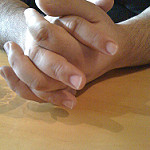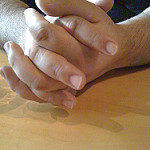Finding Healing: Telling Your Children About A Past Abortion (Part II)
10/11/16
This is part II of a series on telling your children about a past abortion. For Part I, “To Tell or Not to Tell,” click here.
The Importance of Healing
 Another important thing for parents to consider is how much healing they themselves have experienced, said post-abortion counselor Trudy Johnson, who also went through an abortion.
Another important thing for parents to consider is how much healing they themselves have experienced, said post-abortion counselor Trudy Johnson, who also went through an abortion.
“I have counseled women who have just ‘come out of the closet,’ who are barely out of denial themselves and think they need to immediately tell their other children,” said Johnson, who holds a master’s degree in counseling. “In these cases I always tell them no . . . If you are not really healed, I believe the news can come across as ‘dumping’ on them or being condemning. The whole ‘telling’ process shouldn’t be a matter of dumping your grief or guilt, but rather, sharing your heart tenderly for truth’s sake.”
Johnson said that while telling one’s child can be a step in the healing process, she doesn’t recommend it unless the parent has gone through a post-abortion counseling class and worked through the pain.
Philip Ney and Theresa Burke both agree that unless telling a child right away is absolutely necessary (such as when the child has already guessed or discovered that an abortion took place), parents need to resolve their own conflicts and mourn the loss of the aborted child first. Otherwise, they will not be prepared to deal with the children’s reactions in a healthy manner, and may communicate their own fears and unresolved issues to them.
“No one should ever tell their children about their abortion until they have experienced an intense healing process themselves,” Burke said. “The most important thing children need to know is that they are loved and that the parent is stable. If a grieving parent went to a child with an abortion confession, it could be very threatening to the child if the parent has not been through a healing process themselves.”
Many parents also say that the timing of an abortion confession is important. They say parents shouldn’t “rush” the process, but carefully consider how and when to talk to their children, as well as how the children might be impacted by such news.
“I’ve run across many women who end up telling their daughters when they are facing the same experience of an unexpected pregnancy,” Valeska said. “Often the daughter will think that if mom did it and she is okay, then I need to do it too, or it is okay for me. I’ve seen other cases where there is a deathbed confession of abortion, which leaves the family with the aftermath and nowhere to turn to have their questions answered.”
Bonopartis said “women also have to be prepared to allow their children to feel whatever they need to feel and to work through it, allowing the children to express themselves. In this way, the children can feel that no matter what they say, they are safe and loved.”
Sharing the Past
Lisa, who had an abortion 11 years ago, said she chose to tell her daughter at a young age because of her involvement in post-abortion ministries.
“When my daughter was about six years old and I was speaking regularly about my abortion, I really felt that I needed to tell her,” she said. “Many think that is way too young, but I didn’t want to hear about it from someone other than myself.”
Her daughter is now eight, and her mother said she seems “to feel very comfortable” with the abortion issue.
“I tried to give her as much information as she wanted and then that was it until the next time,” she said. “She would think about it and let it sink in and then come back to me with other questions. I was always honest with her without giving her more than I felt like she could handle.
“I am happy and comfortable with the way I have done this. I plan to do my best to keep these lines of communication open so this never becomes a stumbling block for her.”
Sometimes children have already guessed or sensed that there was an abortion in the family, perhaps after having overheard a conversation or guessing that the mother was pregnant without a baby appearing. When Janet told her teenage daughter about her abortion, her daughter responded by saying that she had often thought that there had been another child in the family. “She did not understand why she would think this but for some reason she did,” she said.
Another woman, Shelia, said she felt at first that telling her children about her abortion “put distance between us,” but she knew that her children needed time to work through the grieving process.
“At first it was very painful, but today I have absolutely no regrets about telling them,” she said. “I knew that the truth needed to be spoken; that I wanted them to understand what hell these abortions had caused me and to know the truth about what abortion does to a woman. I wanted to share about the redeeming love and mercy of God.”
Christine, who has told her teenage children about her abortion, acknowledges that while telling her children about the abortion had painful consequences, she is glad she took that step.
“My children are coping with the knowledge of what I did, yet not without a struggle,” she said. “They sometimes asked me questions, which I answered to the best of my ability. But my second child still sometimes avoids the subject, looking away from me . . . My children and I still need more restoration. But at least a very important step has been made. An openness has been created and I’m very grateful to no longer have this terrible secret from my children.”
Other women, like Trudy Johnson, chose to wait until their children were adults before telling them of a past abortion. Johnson shared her story of telling her two grown sons in an article she wrote for Focus Magazine. Although she struggled with fears about telling them, she wrote, the letter she received from one of her sons in response was “probably the most loving thing he has ever done for me.”
“Dear Mom,” her son wrote. “Thank you for being honest about this terrible thing . . . I know it must have been hard for you to share it with me, but honest, Mom, I hope you don’t think I would hate you . . . I feel so sad for our family. When I read your words, it was like all the puzzle pieces of my life fell into place. . . . I always felt our family had a ‘missing piece’ . . . Our home had an emptiness, an inexplicable sadness. Now I know why.”
Helpful Hints
Valeska feels is it important to give children an opportunity to grieve the loss of a sibling and make some tangible connection to the aborted child. She and her husband are planning to honor the memory of her child with a marker at the National Memorial for the Unborn in Chattanooga, TN, which has a “Wall of Remembrance” where grieving parents and family members can honor children lost to abortion. They decided to let their oldest daughter choose the inscription for the marker.
“I’ve had the opportunity to grieve; this is her opportunity to make that connection,” she explained. “If I would have had a child who died after birth, I would have had photographs, something to allow our children to make a connection with her, but she doesn’t have that. This will give her that connection.”
Many parents say that prayer–both before and after talking with your children, if you choose to tell them–is key. “God will lead you to knowing the right time and giving you the right opportunity,” Janet said.
Christine agreed. “I would strongly recommend that those mothers who need to tell their children make sure to be surrounded by prayer, and also, if they are very much afraid to tell, that they would ask a very skillful person to be around so they can talk about how things went as soon as they can.”
Theresa Burke said that if a parent chooses to disclose an abortion, “it should be done within the framework of the Lord’s forgiveness and mercy–that even though something awful has happened, God has forgiven the person, and forgives all of us if we are sorry about what we did.”
Cecilia said parents should tell their children that they can always come to you if they are facing an unplanned pregnancy.
“I told my daughter that if she became pregnant she could come to me; that I do understand–I have been there,” she said.
Bonopartis believes that in the end, telling her sons about her past abortion ten years ago has been healing for her family. “I know it was very painful for them, and although they support my work I know at times they still do not want to read things I have written or look at it too closely,” she said.
“Sometimes I still feel concern, but not very often. I am very proud of them . . . they can get sad, but I believe their reactions are healthy. It has also made them more effective in their own lives in speaking about abortion. They understand the impact . . . they have lived it.
“I think in the end it brought us closer together. It took time, and a lot of talking, but we worked through it. So much of their lives now makes sense to them. They understood finally why things were the way they were, and why I spent years crying.”
Bonopartis recalled the time when she received an award for her work in post-abortion ministries. She said that she was nervous about her son attending the banquet with her because it was the first the time that he was to hear her share her abortion story in public.
“From what I heard, my son was the first one on his feet clapping after I spoke,” she said. “To know my son was giving me a standing ovation after I had gotten up in front of 300 people with him in the room and I had spoken about my own abortion and work–how can you beat that?”
~~~
This is Part II of a series on talking to your children about a past abortion (see Part I). Part III will be published next week. Comments from Dr. Philip Ney are excerpted from the booklet “How to Talk With Your Children About Your Abortion: A Practical Guide for Parents,” by Philip G. Ney and Marie Peeters-Ney (Victoria C-B: Pioneer, 1998).
Find Help
Pregnancy Help and Resources
Center Against Forced Abortions
Post-Abortion Help and Resources
Entering Canaan Resources for People Who Have Lost Siblings to Abortion
Articles on Healing After Abortion
It’s Not Wrong If You Are Hurting After Abortion
Finding Healing After Abortion
Personal Stories About Abortion and Healing
Articles on Hope & Healing
To Those Who Mourn
Men & Abortion
For Teens: No One Told Me I Could Cry
Yes, There is Help & Healing After Abortion


